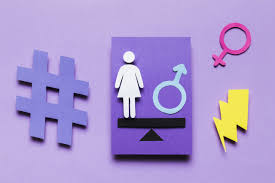Gender Data is Raising Visibility For African Women in The Margins
Civic tech innovators and government agencies are progressively building locally relevant gender data systems. These changes are turning everyday experiences of gender inequality into hard data that informs policy and empowers communities.
Bonface Orucho, bird story agency
Nigerian civic-tech organization TechHerNG launched Kuram, a digital platform, in 2023. The platform helps survivors of technology-facilitated gender-based violence by offering support and a safe space to report incidents.
More than a support tool, Kuram collects structured data on digital abuse, helping to quantify a problem that is often invisible in official statistics.
According to a 2023 interview with The Guardian, a Nigerian news platform, TechHerNG’s Executive Director, Chioma Agwuegbo, explained that online violence goes beyond revenge porn.
“It is bullying, doxing, deepfakes… we encourage women to access and wield technology more, but they are discouraged by the violence perpetrated against them in digital spaces,” she said.
The platform enables survivors to document their experiences, turning isolated incidents into a growing pool of evidence that can shape public awareness and inform legal reform.
Kuram is one of the civic-led initiatives across Africa that are expanding access to gender data.
Another strong example is BudgIT, which introduced the Womanity Index in 2023 in collaboration with Invictus Africa.
The index tracks gender equality and gender-based violence across Nigeria, Ghana, and Senegal using 20 indicators, including legal protections, support systems, public awareness, and budget allocations.
<script src=”https://bird.africanofilter.org/hits/counter.js” id=”bird-counter” data-counter=”https://bird.africanofilter.org/hits/story/?id=2240&slug=gender-data-is-raising-visibility-for-african-women-in-the-margins” type=”text/javascript” async=”async”></script>
BudgIT also launched Bimi, an AI-powered chatbot, in early 2025 to democratize access to public financial data. According to Premium Times, Bimi allows users to query government expenditures in real time, including spending on women’s economic empowerment, helping citizens and policymakers track commitments and demand accountability.
These platforms show how African civic actors are turning lived experiences and public records into actionable gender data, linking social advocacy to structural change.
Alongside civil society efforts, African governments are also strengthening national gender statistical systems. Many are embracing gender-responsive data to close information gaps and drive more inclusive policymaking.
According to experts, this marks a growing assertion of African agency, as countries increasingly take ownership of the tools used to measure and shape their development agendas.
“This isn’t just about numbers anymore,” said Isabella Schmidt, gender statistics specialist at UN Women. “It’s about ownership of the narrative.”
The latest Gender Data Outlook 2025, a regional statistical brief by UN Women and PARIS21, shows that African countries have achieved just over half their potential in gender data capacity. However, with an average index score of 0.516, the region still faces a 48% capacity gap.
Yet momentum is building. Eighteen countries are now performing above the global average, including Kenya, Rwanda, Uganda, South Africa, Morocco, and Botswana.
According to Schmidt, these countries are not only producing more data, but also using it more effectively.
Kenya leads with a score of 0.756. Gender data there informs national budgets and program design. The Kenya National Bureau of Statistics has integrated gender modules into major surveys and aligned its reporting with the SDGs.
Civil society groups, such as the African Population and Health Research Center (APHRC), supplement government data by focusing on reproductive health, education, and urban planning.
Rwanda, with a production score of 0.767, uses gender data to monitor land ownership and guide support for women entrepreneurs in agriculture and SMEs.
It is also a core partner in the Africa Programme on Gender Statistics (APGS), a regional initiative led by UNECA, AfDB, and UN Women to harmonize gender indicators.
Uganda stands out for its enabling environment, scoring 0.933. Gender-disaggregated labor force data supports youth employment planning, while UN Women’s Women Count initiative has helped train officials and improve subnational data systems.
Morocco demonstrates strong data accessibility, with a score of 0.787. Its open-access gender data portals and visual tools inform journalists, legal reforms, and public campaigns on violence against women.
Senegal has integrated time-use and unpaid care work data into national planning, shifting how women’s contributions to the economy are valued. The country has reallocated budgets toward childcare infrastructure and caregiver support, earning a high accessibility score of 0.714.
Zambia is embedding gender data into its Integrated National Financing Framework to guide spending in health and social protection.
These examples share more than just technical strength. What connects them is political will.
As the Gender Data Outlook puts it: “The ultimate measure of success lies in the effective use of data.”
Still, challenges remain. The report notes that 41% of the data required to monitor gender-related SDG indicators is missing across Africa. Most countries rely on donors to fund more than half of their gender data activities. And global funding for gender statistics has declined since its 2019 peak.
Despite these constraints, countries like Sierra Leone demonstrate that political commitment can overcome economic limitations. With a GDO score of 0.656, it outperforms wealthier peers by partnering with local NGOs to build district-level data capacity, especially in tracking maternal health and gender-based violence.
South Africa, with an enabling environment score of 0.967, is training municipal officials in gender data use to ensure that local planning aligns with national gender goals.
Cross-border collaboration is also expanding. Countries are aligning metrics, sharing tools, and strengthening regional initiatives like the APGS. Platforms such as SmartDataFinance.org are helping track funding flows and match countries with donors.
Stronger ecosystems are helping Africa measure what truly matters. For instance, UNESCO research found that in some Francophone regions, schools led by women produced learning outcomes equivalent to an extra year of schooling. Insights like these are informing teacher training and leadership placement.
According to Susan Katana, a Kenyan gender advocate, these developments confirm Africa is no longer waiting to be measured.
“Countries are building their own systems, aligned with their priorities. These systems help governments tell their own stories and shape their own futures.”
“Gender data is no longer trapped in reports like in the past,” she explained. “It’s showing up in budgets, in school policies, in healthcare plans. It’s beginning to touch the daily lives of women who were invisible to the system before.”
bird story agency







